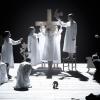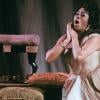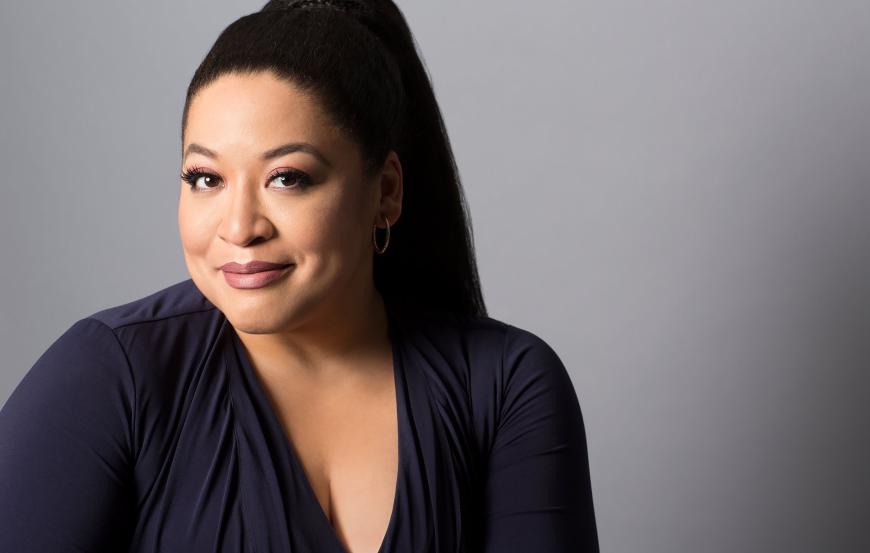
Soprano Michelle Bradley was scheduled to take her first bow at San Francisco Opera as Elvira in Verdi’s too-rarely performed Ernani. But like a lot of plans set for 2020, that performance never came to pass. This month, local audiences will have a chance to pick up at least part of that stitch, when Bradley makes her company debut in Francis Poulenc’s Dialogues of the Carmelites, which runs Oct. 15–30.
The inclusion of Poulenc’s masterpiece in the company’s centennial season is, in part, an homage to the fact that the work’s American premiere took place here in 1957. In addition to that historical significance, it is difficult to contemplate this opera in this house without recalling it as the venue for perhaps the most significant career debut in the company’s history, that of Leontyne Price in the role Bradley is set to sing, Madame Lidoine.
The role, originated in the work’s 1957 premiere at La Scala by Leyla Gencer and in its original French in Paris the same year by Régine Crespin, requires a special kind of voice. Though not a particularly high role for a soprano, the part must have depth and a purity of tone that conveys the intense moral certitude of one about to be martyred. Voices that favor Verdi are a good place to mine that kind of gold, and like Price, Gencer, and Créspin, Bradley’s talent has found expression in that composer’s heroines.
She has sung the title role in Aida in Prague, San Diego, and at Finland’s Savonlinna Opera Festival. And after San Francisco, Bradley will sing Aida with the Metropolitan Opera, where she was a graduate of the Lindemann Young Artist Development Program. She has already tackled both Leonoras (La forza del destino in Frankfurt and Il trovatore at the Staatsoper in Vienna). “When it’s time to get up and sing,” Bradley has said of Verdi, “he wants everything. You have to be prepared to give it.”
Critics have called Bradley’s voice “thrilling” and “voluminous.” Of her interpretation of “D’amor sull’ali rosee,” Matthew Guerrieri of The Washington Post wrote: “It was a full-throated, even forceful reading that, at its best, embodied the paradox: a performer with enough control to throw caution to the wind.” That review was in December 2019.
Just as careers were altered, and some ended, by the catastrophic events of two world wars, singers of Bradley’s generation have been deeply affected by the pandemic. For Bradley, lockdown was spent at home with her family in Versailles, Kentucky (pronounced “ver-sales”). The time was challenging, with engagements canceled, but also nurturing. Bradley’s friend, Lori Hicks, allowed her to practice in the empty music buildings of her alma mater, Kentucky State University, while a minister friend of the family gave her the keys to a Baptist church where the singer prepared much of her repertoire for a pair of deeply personal recitals for San Diego Opera, where she will perform Tosca in 2023. A highly praised Tosca in Chicago, and her debut here in San Francisco, are further evidence that this singer is well on her way to the kind of career that trackers like WQXR’s “40 Under 40” predicted she would have.
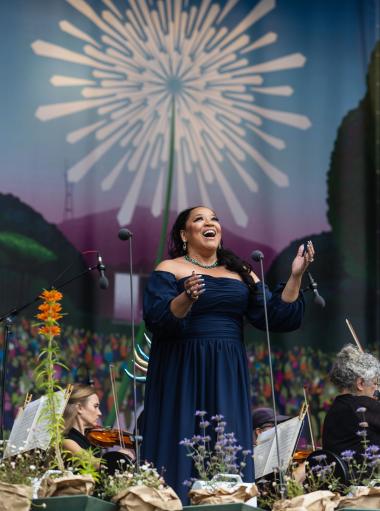
In addition to her bows in San Diego, California audiences heard Bradley last year as the soprano soloist in Beethoven’s Symphony No. 9 with both the San Francisco Symphony and the Los Angeles Philharmonic. Dialogues will be Bradley’s first French operatic role, but those who enjoyed last month’s Opera in the Park concert were given a sample of her Gallic interpretation with a rendition of the beloved aria “Depuis le jour.”
The singer made time to speak with SF Classical Voice via Zoom. We began with a discussion of Bradley’s early childhood.
Is it true that you taught yourself piano on the demo keyboards at Kmart while your mom shopped?
Yes. I grew up with three brothers, so I was a real tomboy, a hyper, high-energy little girl, and music really calmed me down. When my mother would go to Kmart, she’d say, “OK, you stay in this one spot,” and that wasn’t a problem for me because they’d have all the electronics plugged in, and there were keyboards, and I’d go and play. As a very small child, I was interested in music. As a toddler, I was imitating my parents’ singing and taking my mother’s dishes, pots, and pans and beating on them, trying to compose my own beats. Fortunately, my parents noticed that, and they eventually bought me my own keyboard for Christmas, and I taught myself. I grew up in church, so I’d sing along with the choir on all the hymns, and I’d remember the keys they were in, and I’d come home and pick them out on the keyboard, and I ended up playing for my church. So yes, long story short, it’s all true.
I saw a picture of you as a 15-year-old on Instagram, and I think the caption you wrote was “shy kid.” Would you say you have outgrown your shyness, or are you still a shy person?
When I’m onstage I’m not shy — I think because the music gives me the motivation to do what’s needed of the character. Vocally, I feel very confident. I’m of a certain age, I’ve lived with my voice a long time, so I know what it can do. I’m confident in that. But offstage I still am pretty reserved. I’m not a person who is the most comfortable in social situations.
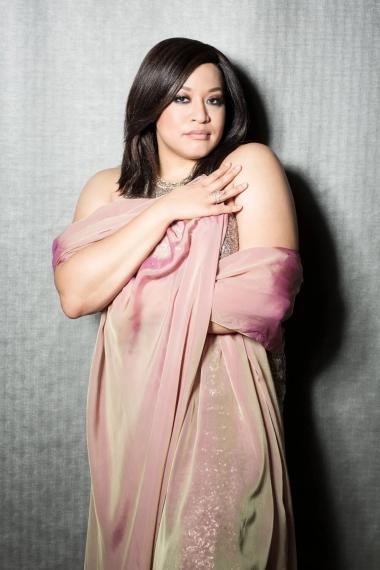
That shy girl you saw on the Instagram page, she was worse than I am now. She wouldn’t talk until she got home from school. I had really crooked teeth before I got braces, and I used to get bullied a lot in school, so I wouldn’t talk until I got home, and even when I got home, I wouldn’t talk that much, so I guess I gave my voice a lot of rest. [Laughs.]
There’s a story about you singing in the closet as a kid and your brother ratting you out to your parents. And it sounded as if, at that point, your parents said, “Well, now that you’ve got this gift, this is for sharing.” And I am wondering if there is public service aspect there. Your father was a police officer, and public service was important in the family. Is there a connection there?
In a way, yes. It’s more so from the background of spirituality and church. My parents would tell me that “you have a gift” and that “God doesn’t bless you with something like that for you to keep to yourself.” It’s meant for the benefit of other people. It’s meant to uplift and bring people peace. So, in a way, they trained me almost like a minister, which is kind of what I am in this opera, too. I’m always having to comfort and give good news. I was 15 when I did my first solo in church, and from then on, I was singing at weddings, funerals, retirement parties, baby showers, all over my hometown and within central Kentucky. I was singing everywhere after that, so yes, my parents did instill that in me. All of my teenage years, while other young people were out partying and dating, I was going to sing somewhere, and my father was always taking me, so yes, I was a public servant.
I hadn’t connected that idea to this role, but let’s talk a little bit about Madame Lidoine. In Suor Angelica or other operas where singers are dressed as nuns, there can be challenges from wearing the habits and not being able to hear well. Are there any physical challenges there?
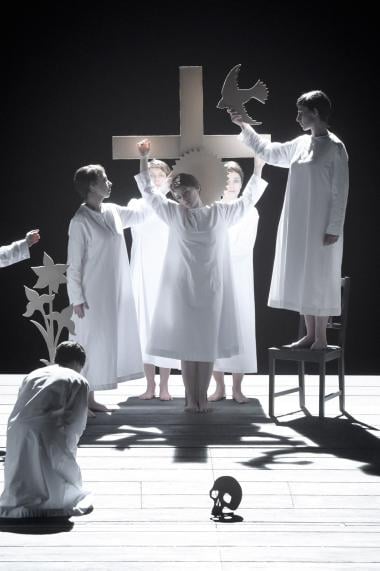
Because it’s a new production I can’t give too much away, but our ears are not necessarily covered, so nothing is muffled. And I can say that the costumes are very well made. In my fittings, they took a lot of time to make sure that everything was just right. Although we are nuns, and nuns are not very glamorous, everyone will still look really good and very realistic to the characters we play.
In regard to the role, I do see myself as a minister in this piece, just by the things I’m saying. Both of my two arias, everything starts with “mes filles, mes filles” — my daughters, my daughters. I’m always comforting, always trying to unify everyone and keep us together, even in the face of death at the end. As you know, as Madame Lidoine, I start us off, like, “Hey girls, we’re still going to be OK, even in this, and I’m going to show you how it’s done,” [Laughs.]
Also, growing up in church, I can identify with a lot of the biblical references that are in this. At the end of one of my arias, I say that Christ, even on the cross, knew the fear of death. I reference him in a lot of my sayings, and it is something important in my personal life, faith, so I can expand on that and add a little bit of something personal from me to this character. I also find, being the lead nun, the mother, I try to exude that [role] with my colleagues offstage. I make sure that I have the right attitude.
Something that we started doing, it’s just some type of energy: We’re always hugging each other, and I’ve never been in a production where there’s that much affection. We don’t just say hello to each other. We literally hug each other, a lot, and I like that. I don’t know why people always want to come and hug me, but I’m not complaining. I actually have said to them, “Let’s keep this going,” because I think it helps us when we’re onstage because we need that type of unification. I also like being on set with women where we can get along in that capacity. We enjoy being around each other, and that has felt really good. I think because I’ve never had a sister, and always wanted one, I enjoy being around all that girl power.
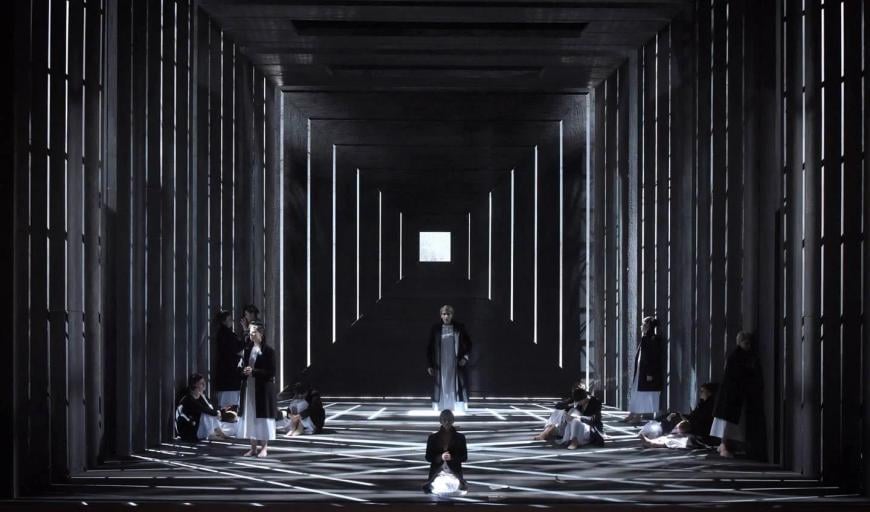
You keep in touch with all your former teachers, and that’s something I am hearing more often from singers these days. It used to be singers were more careful to name only one teacher for an article. If you could, I’d like to talk specifically about Lois Alba of Houston. You once described her as “the lady who directed me to the life I have now.” Can you say what you mean by that?
I had been told, even in grad school, where my teacher was Myra Merritt, who was also a soprano at the Metropolitan Opera, that the Met is where I need to go. But Lois really pushed me. I met her at a time in my life when I was trying to figure out what I could do musically. I had just moved to Houston to join the chorus there, and I found out about Lois, and from the moment she first heard me, she said, “That is a voice for the Met, and that’s where you’re going to go.” She had me on YAP Tracker, filling out applications all the time, and then she said, “You need to try Music Academy of the West,” which is where she had gone, and everything really started taking off. After Music Academy of the West, Marilyn Horne mentioned me to James Levine.
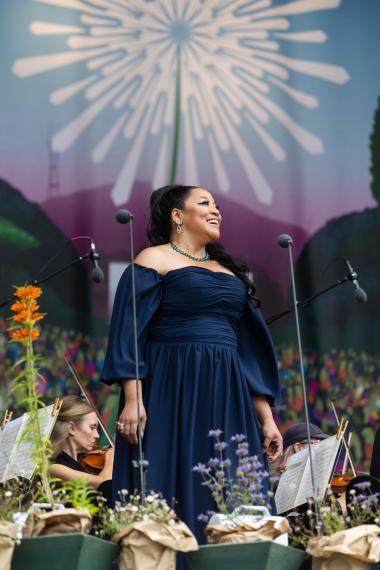
Lois really propelled me. I started working on Aida with her, Verdi roles, and [Bellini’s] Norma as well. I learned that I was not only a soprano but a dramatic soprano, meant to sing the rep I have now. She helped me to find my voice as well, so yes, she gets a lot of credit. I talk regularly to her. I talk to Myra Merritt regularly, and Diana Soviero. Every one of my teachers helped me out in a different area of my life. I couldn’t just have one. I needed them for that time in my life, and I still keep in touch with all of them. All of them have poured something into me that helps me to do this. And I have a coach that I work with, Jeffrey Goldberg in New York. No matter when I call, he answers. If I need help with my languages or anything, he’s there for me. So, they’re all in my circle.
I struggle with what to call this year for you. Part of me wants to call it a breakout year, but you’ve already had a good deal of success. Still, you have some big stuff this year. How are you feeling about a transition from success to more star-level engagements?
I’ve never thought of it that way. I just think: On to the next. I’ve got this engagement to prepare for. Make sure I’m ready. Do my best. Yes, I do have Aida at the Met this year, that is a very big deal for me. I’ve sung at the Met, I was in the Lindemann Program, I did some minor roles, and last year I sang Liù [in Turandot] at the Met, which was a big thing for me. But Aida is something very special. Of course, it’s another Leontyne [Price] role, but also a lot of other great sopranos have done it, and it’s one of the more popular productions at the Met as well, so no pressure. I do see that as a big step in my career. But I’m always learning, I’m always trying to be better. I don’t even know if I can say “success” just yet. I don’t think I’m at that level yet. I’m still working my way up. I really am. I’m still learning, I’m preparing. Yes, I’m doing a lot of firsts. Dialogues is my first French opera. I debuted Tosca at Chicago, that was a house debut and a role debut. I’m just starting everything this year, getting my feet wet.
I’m wondering about German repertoire for you. Maybe Ariadne? Or Sieglinde?
I do love [Richard] Strauss. I’ve done the Four Last Songs, which are a standard part of my repertoire, and I do hope to perform them again somewhere. Maybe Elsa, to start off slow in the Wagner, but I do hope to get into Sieglinde, Brünnhilde, and maybe even Salome, who knows. I would love to explore Strauss more. Ariadne, yes. There’s a lot of stuff I would like to do. And the way things are going, with time, I probably will get to do them. This opera and Tosca are things I didn’t think I’d be doing, so maybe there are more surprises to come.
Is there anything we haven’t touched on that you’d like to discuss or mention?
I would like to make something known with regards to San Francisco Opera. They have been very good to me, especially in 2020 when I wasn’t able to come for Ernani; they still paid me half my fee, and I can’t be grateful enough to them for doing that. I lost all of my work, as many other singers did, and I know not all singers had that type of support. San Francisco is a wonderful place, and they really take care of their singers. They have very good COVID protocol. We’re testing constantly, and we’re made aware if there’s an exposure, and we are kept very, very safe. I’ve enjoyed my time here. I do want it known, what type of house this is. This is a great, great house.


